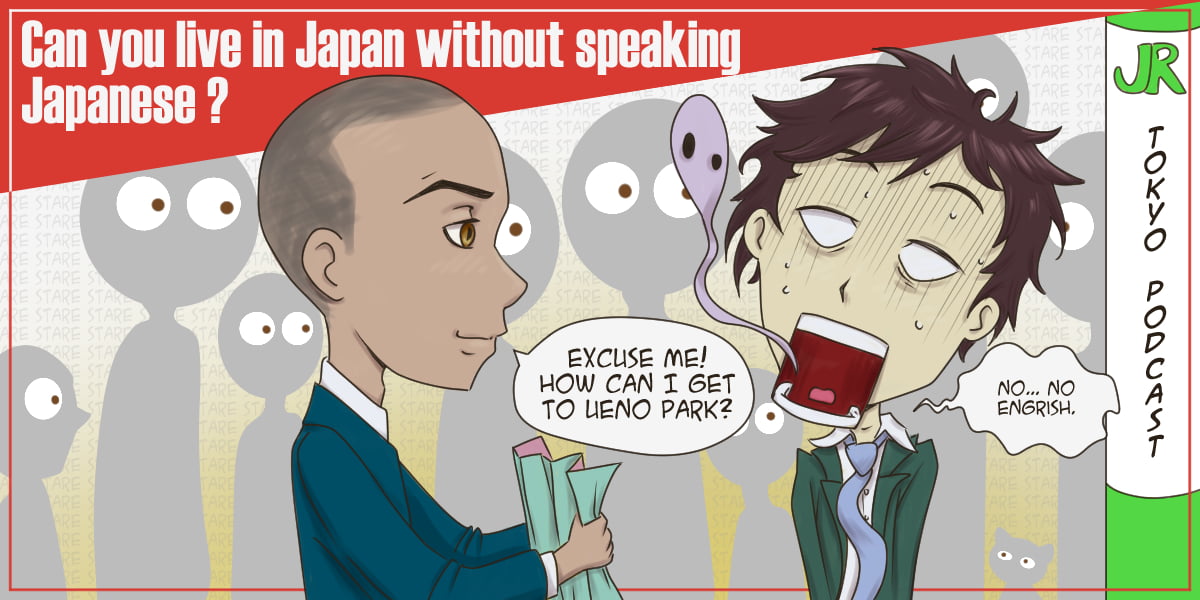We’ve received variations of this question often—”Can I live in Japan without speaking Japanese?” “How much Japanese should I learn if I want to work in Japan?”—but this episode was ultimately sparked by one of our listeners who asked how Japanese people would react to a non-Japanese-speaking foreigner traveling through Japan.
This week, Anthony answers all of these questions in one episode and shares his wisdom based on his years of living in Japan, working with Japanese clients, and traveling in Japan, all without speaking Japanese. In short, the answers to all of these questions are “yes,” but there are caveats to each. Let’s dive in.
Can You Work In Japan Without Speaking Japanese?
It’s certainly possible to work in Japan without speaking Japanese, though your options will be limited. The first choice by newcomers to Japan is typically teaching English at private English language schools, or eikaiwa. These schools actually prefer their teachers don’t speak Japanese, as they strive for an authentic, “English-only” environment. Unfortunately, teaching English in Japan in 2020 means a typically low pay ceiling with not much room to advance. Many use this job either as a secure means to live for one or two years before returning to their home countries, or as a springboard to their next careers in Japan.
Another possibility is recruiting, or headhunting. These jobs have potentially higher salaries, but typically provide a low base pay with performance-based commission bonuses. As such, these positions can be very high-stress, but potentially rewarding, especially if you have a compatible, highly-driven sales temperament.
One more option is software engineering. This is a relatively newer position that’s cropped up in Japan, but some positions are available with little-to-no Japanese language ability required. That being said, the salaries for these positions is much lower than in, say, America, so we don’t recommend this route if you’re looking to develop your career.
Beyond these choices, you’ll be hard-pressed to find work without having at least some Japanese language ability. Of course, you could always start your own business, as our host Anthony and some of our guests have done.

Can You Live In Japan Without Speaking Japanese?
This is admittedly much easier than working in Japan without speaking Japanese. You’ll undoubtedly face some tough challenges—especially with more adult responsibilities, like opening bank accounts, paying utilities, and registering for government services—but this is becoming easier by the year as more companies and local governments are taking strides to cater to foreigners in Japan. On top of that, you have an enormous arsenal of apps and other resources at your disposal, such as Google translate, blogs, and online expat communities that can likely give you solutions or advice for almost any task without knowing Japanese.
It’s important to note, however, that the range of your potential relationships and social circles will suffer. A common gripe amongst foreigners in Japan is that it’s difficult to make Japanese friends, and this is especially the case when one doesn’t speak Japanese. While many Japanese people would jump at the chance to befriend you to practice English, the novelty may quickly wear off as they have to constantly translate for you. The same goes for befriending bilingual expats—you’ll be completely dependent on them for any language challenges, and that can strain a relationship. What you’re left with is a limitation many foreigners in Japan face, which is having a social circle consisting only of other non-Japanese-speaking foreigners in Japan. This certainly isn’t bad per se, but it’s more restricting than if you were to speak Japanese.
Traveling In Japan Without Knowing Japanese
Traveling in Japan without speaking Japanese is surprisingly easy, thanks to smartphone technology, Japan’s impeccable public transportation, and the friendliness of Japanese people. Google Translate is your dear friend, able to not only translate written text in real time, but also speech from and to Japanese. Google Maps has exquisitely accurate train times and transfer routes, even navigation routes within stations, and in the rare case of a train service disruption, the timetables and notifications are updated quickly.
What if your phone dies or you lose service? Japanese people are famously kind—especially toward foreign travelers and newcomers—and have been known to go far out of their way to give you directions or even walk you to your destination. This is all the more true in smaller towns, where you’re more likely be lost. You’d benefit from knowing a smidgen of Japanese (or at least being creative with non-verbal cues and simple English), but you shouldn’t expect to be completely lost in Japan if you’re willing to reach out for help.
Working, living, and traveling in Japan without speaking Japanese is feasible, and there are countless examples of foreigners doing so. Having said that, learning Japanese will put you at an exceptional advantage in both your professional life and daily life. Living in Japan without speaking Japanese is becoming much more easy, but knowing Japanese will open doors to the bounty of adventures, relationships, and wonderful experiences this country has to offer.
Want to learn Japanese but don’t know where to start? Check out our previous episodes:








